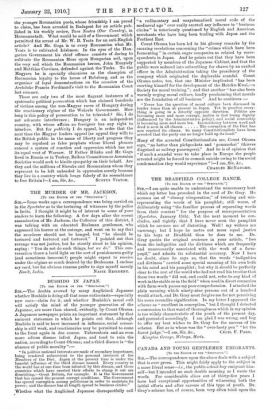BUSHIDO IN JAPAN.
[To THE EDITOR Or THE " SPECTATOR."' SIR,—The doubts avowed by many Anglicised Japanese whether Bushido is doing all that some enthusiasts—especially new ones—claim for it, and whether Bushido's moral cult will satisfy the mind of the younger generation of the Japanese, are more than shared, evidently, by Count Okuma. A Japanese newspaper prints an important statement by that eminent statesman in which he points out that, although
Bushido is said to have increased in influence, social censor- ship is still weak, and reactionaries may be permitted to come to the front again in due course. Tuberculosis and an even more odious disease infest Japan, and tend to ruin the nation, according to Count Okuma; and a third disease is "the absence of public morality ":—
" In politics national interests are made of secondary importance, being rendered subservient to the personal interests of the Members of the Diet. Japan at the present time is under the baneful influence of the third disease named. Every country in the world has at one time been infested by this disease, and those countries which have exerted their efforts to stamp it out are flourishing,—Great Britain, for example. It is the Government that has caused the present corrupt conditions. The Government has spread corruption among politicians in order to maintain its power ; and the disease has at length spread to business circles."
Whether what the Anglicised Japanese disrespectfully call
"a rudimentary and unsystematised moral code of the mediaeval age" ever really exerted any influence in "business circles" is notoriously questioned by English and American merchants who have long been trading with Japan and the Furthest East.
Count Okuma has been led to his gloomy remarks by the amazing revelations concerning the "crimes which have been fermenting " in certain sugar companies as related by corre- spondents in Japan. And he points out that they have been supported by members of the Japanese Cabinet, and that the public were seduced into subscribing for shares by an exalted officer in the Administration taking the presidency of the company which originated the deplorable scandal. Count Okuma notes, too, that one Minister implicated "has been exerting himself for the development of the Hotoku-Kwai,--a Society for moral training "; and that another " has also been warmly urging moral culture, loudly proclaiming that morals are the foundation of all business." And he continues :-
"Never has the question of moral culture been discussed in louder tones than at present in Japan. Yet in practice every- thing is going in a directly opposite direction. Politics are becoming more and more corrupt, justice is fast losing dignity (influenced by the Administrative policy), and social censorship is becoming more and more lax. Inconsistency between word and
deed is seen in all classes The corruption of the Diet has now reached its climax. So many Constitutionalists have been arrested that the party can no longer hold up its head."
Many of the arrested Constitutionalists are, Count Okuma says, "no better than pickpockets and gomanohai ' (thieves disguised as railway passengers)." And he is of opinion that "if such a scandal were to take place in Europe the people arrested might be forced to commit suicide owing to the social condemnation they would experience "!—I am, Sir, &c.,
CHARLES MCNAUGHT.






































 Previous page
Previous page